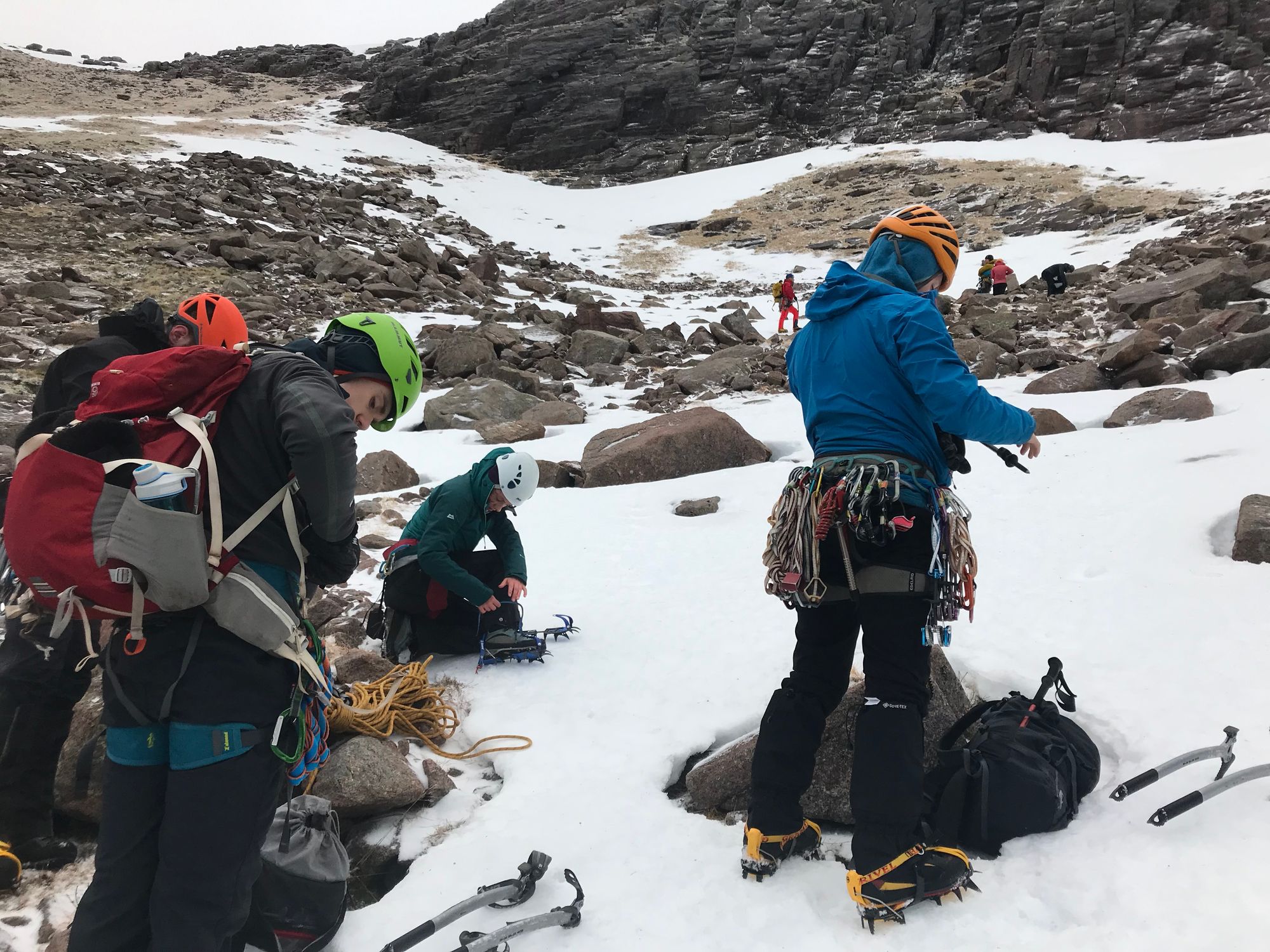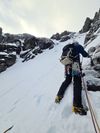Scotland Kit List!

Our other kit lists:
Standard Kit List | Scrambling & Nav Kit List | Alps Kit List
Scotland can get incredibly cold in the mountains! It is essential that you read the kit list below and ensure you either have everything on this list OR MESSAGE the Mountain Secretary (Aaron Burgess). Despite it being a tad gear intensive, the club helpfully provides most of the expensive bits of kit you'll need for the trip.
On the hill, you should be wearing no cotton clothing. It absorbs water/sweat/body heat melted snow and does not wick it away from the body. Thus you lose heat faster and are at increased risk of hypothermia, among other downsides.
The Equality, Diversity and Inclusivity Secretary runs the club kit share which contains a small selection of personal kit which you can borrow.
A day on the Scottish hills
There are six days during the week. While you shouldn't go out and buy sixes days worth of kit, two or three pairs baselayers and socks work quite well. Either you wear them multiple time, hand wash it, or go laudramat hunting as the accommodation does not have a guest washing machine.
- Boots (need to be B2 or B3 rated) - These are essential for the trip.
The main investment you'll need to make will be a pair of sturdy B2 Winter Mountaineering Boots. Brand new, a pair of La Sportiva Trango Towers or Scarpa Mantas can cost more than £300 now!
However, you can also acquire a used, good-condition pair can be found for less than £130. Search eBay, OutdoorGear Exchange (FB Group), and OutdoorKit Exchange (FB Group) and ask around the club for anyone who is selling. If you are struggling to find boots please reach out to other members to help you source a pair second-hand.
It's worth noting that B2's are also great for hiking and scrambling all year round, so they're worth getting! And they will also get you into summer alpinism!
Read more: https://www.absolute-snow.co.uk/buying-guides/the-absolute-guide-to-mountaineering-boot-grades-b0-b1-b2-b3 and https://www.ellis-brigham.com/mountaineering/mountaineering-boot-buying-guide as for the 'boot style' section, you only need to concern yourself with the 'single style boot'. - Warm Socks - Bridgedale Summit socks are optimal but a bit pricey, go outdoors and do plenty. SealSkins are very cool as they are waterproof! Smartwool socks are deluxe. And a spare pair.
- Liner socks - optional but can help if you suffer from blisters
- Thermal Top AND Bottoms - These don't need to be very Gucci, Aldi and TKMaxx, Mountain Warehouse and Sports Direct do some great deals. Merino wool will keep you toasty if you hate the cold but synthetics are also great (and a bit cheaper).
- Trousers - These need to be NON-Cotton and stretchy so that you can walk and climb in them. Ideally, winter walking or mountaineering trousers. Craghopper does a brilliant pair for very cheap at GO Outdoors.
- Waterproof jacket and trousers - These are essential. Please make sure you check with the Mountain Sec if you are at all unsure whether your jacket is waterproof or water-resistant! If it is only water resistant you will get very very wet.
I would not recommend buying expensive waterproof trousers or even using a pair if you already have some. Especially if you are new to winter mountaineering, you will put a crampon hole in them particularly if they are baggy. Baggy waterproofs can be constrained by gaiters but it doesn’t guarantee anything. - Gaiters - These are optional but keep the snow out of your socks and your boots dry! Trekmates sell them for a very reasonable amount.
- Fleeces - Bring multiple spares and get thin and thick ones to give you options. Also, make sure they are sized so you can layer them up.
- Warm hat & buff, and/or balaclava - A buff/Balaclava is one of the best things you can get to cut the wind out. Your hat needs to fit under a helmet.
- Gloves - It's important that you get this one right because your fingers will be the first thing to get cold if you don't have suitable gloves. Your main pair of gloves will need to be waterproof and insulated. Simond does reasonably priced effective winter gloves.
Then one thin pair to go underneath. (Also known as liner gloves. Make sure the main pair fit with them on and are not too tight. If they are they will reduce circulation and thus heat entering your fingers).
You will also need a spare main pair so if you lose your main one or they get soaked for the walk-off. If you get super cold then a pair of mitts are a good choice for this! - Rucksack for climbing - 35l-50l. A mountaineering rucksack is ideal but not required. Again Simond does a great pack - otherwise look for cheap second-hand alternatives from brands like Berghaus, Osprey, Lowe Alpine, Mountain Equipment etc. (see the picture below for some of the things you would carry with you in the rucksack).
- Down/synthetic jacket - optional but warm. If you get very cold then this could be useful. However, if you can't afford to get one simply layering more fleeces will do the same job!
- Head torch and spare batteries - They will be an essential item just in case you end up in the dark on the mountains.
- Goggles - Exactly the same as ski goggles. Aldi sells them in the random aisle for a tenner. Make sure you stay away from CAT 4 lenses if you want to see them in low light. But as long as they keep the snow out of your eyes you'll be fine. Bring one pair of goggles and then a pair of sunglasses as a spare. Occasionally appear in Aldi around this time of year.
- Compass - Long baseplate. If you don't have one the club will bring some.
- Map(s) - Harvey or OS. Primarily covering Glen Coe, secondarily the Ben. You can ask the Mountain Sec for more information if you wish to get one.
- Thermos flask & water bottles - Sometimes it is cold enough for the water bottle in your bag to turn to ice so having your water in the form of a hot drink can be a real energy boost and a good way to keep it from freezing.
For water 1 or 2 litres in bottles. E.g. a nalgene or generic metal or plastic ones. I would caution against hydration packs as the pipe will freeze, the bag may, and you could puncture it with your crampons all stuffed in your bag. - Orange/tinfoil survival bag - These are super cheap and light and a great way to keep yourself warm if an emergency occurs. Not optional.
- Dry bag(s) or other solution - Either get specific dry bags however they are pricy, or thick bin bags or a rubble sack as they also work really well and are very cheap. Or a rucksack cover, until you learn they are not worth it.
- Personal first aid kit - This should include any personal medication you need, lip balm, the survival bag, blister plasters etc
- Blister plasters or good zinc oxide tape
- Tissues and sanitary supplies
- Harness, belay plate/carabiner, iced axes, crampons and helmet - These can all be borrowed from the club so don't worry. If you did not put these on the sign-up form, you need to tell the Mountain Sec or there won't be any for you.
- Any other climbing equipment you have - Optional e.g. ropes, racks, climbing shoes (in case of a lack of snow)

Back at the hut
- Normal clothes/pyjamas - It isn't a fashion show just bring comfortable clothes
- Toiletries and towel
- Sleeping bag - The hut provides bedding so you don't necessary need a sleeping bag. However, bringing a 3 or 4-season bag may open up opportunities with a potential Bothy trip or bivvying. A sleeping bag linear ideally with a 3 season.
- Roll mat - for the potential Bothy trip or bivvying
- A second bag to put the rest in
- Teddy bear - a range of technical climbing teddy bears to meet your needs can be found here at a great price https://ubmc.uk/teddy (rip no longer available)
- Formal clothes for the potential Burns Night dinner
Update: We will be attempting to go to Clachaig's Burns Tribute Night, a more casual affair. Bring something nice but no need for a suit, see the link for an idea. Some will be in shirt and tie.
Places to look
- eBay
- UKC
- Sportpursuit
- Go Outdoors (Good prices and 10% price match if you find it somewhere cheaper)
- Cotswolds (15% discount, see below)
- TKMaxx (Just drop in regularly, they often have Craghoppers, Berghaus, and Mammut at a ridiculously low price)
- Facebook Marketplace (you can sometimes find gems on outdoor kit buy and sell groups)
BMC Discounts Pages
As part of your UBMC membership, you have a British Mountaineering Council membership and insurance. This entitles you to a number of benefits and discounts at selected retailers. Page 1, Page 2, Page 3
Miscellaneous and optional
- Any medication you need
- Sleep mask
- Ear plugs
- Camping stove, gas and pot (for the bothy trip)
- Phone chargers
- Camera
- Phone
- Spare buff
- General shoes
- Hut slippers or sliders
- Sunglasses (goggle back-up) and sun cream if you're feeling optimistic
- Walking poles if you're so inclined
- sleeping bag liner
- any climbing kit you own
- bivvi bag
- Whistle
Apps
You won't need these but if you're interested. They are useful but they should not be your primary or only tool. OS Maps, Outdoor Active and AllTrails are paid but have free trials.
- OS Maps free basic maps, subscription for all of OS's maps or downloads of physical maps you've bought
- OS Locate GPS coordinate in grid reference or Lat/Long without mobile signal. Worthwhile downloading. (FREE)
- Outdoor Active
- AllTrails
Food
We will stop at a supermarket en route to the bunkhouse, later in the journey. This lets you have more space in the car for most of the journey, they will be stuffed, and your cold stuff might still be cold. During the week there is a Co-op in the town and if your group passes a larger shop on the way back from a day out, you could stop at it.
We will organise into cooking groups for evening meals. This will make your life much easier and cheaper. Last year we had two 8 people meat groups and two 4 people veggie groups plus smaller arrangements. This means only one or two from each group have to cook each night, make another pair wash up, making your life so much easier. Make sure you are not cooking on a day you have a long route planned. It will also make the kitchen less hectic. The accommodation has a "fully equipped self catering kitchen".
- Bring money for food (and drink)
- Breakfast - mostly individual, lots go for porridge
- Lunch and snacks for the day (lunch plus other carby foodstuffs work well) plus spare for when you're extra hungry or late back
- Dinner - organised within groups

